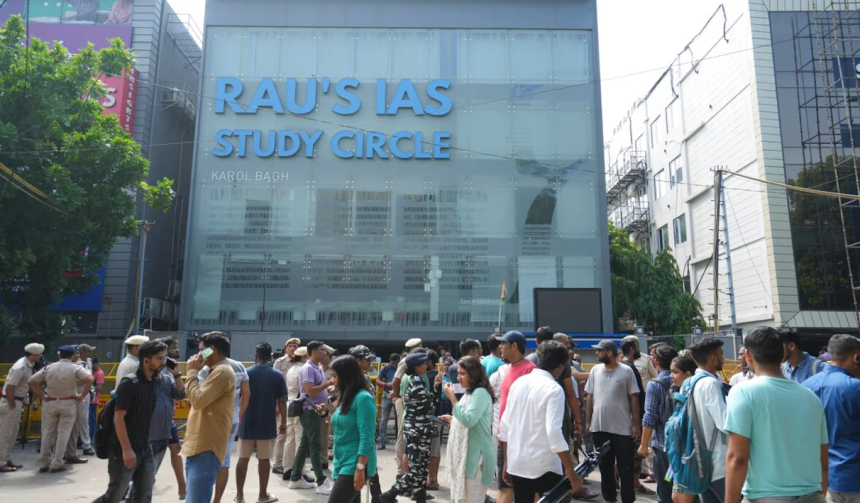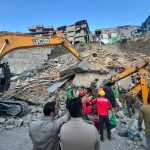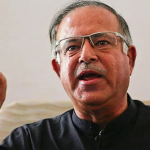Once again, the capital of India, Delhi, finds itself in the spotlight. This time, the reason is not political turmoil but the tragic death of three young aspirants preparing for the UPSC exam. These three youths were buried alive under rain debris in the basement of a renowned coaching institute. Just a week prior, another diligent young man was electrocuted and burned alive by a hanging wire in front of the same coaching institute. These incidents, occurring within a fortnight, hint at a more extensive, hidden reality stretching over the past two decades, a reality that is not hard to imagine.
The areas of Karol Bagh, Rajendra Nagar, Patel Nagar, and Mukherjee Nagar in Delhi are densely populated with coaching institutes. Initially developed to resettle refugees post-Partition, these areas have now become hubs for educational coaching. A powerful mafia, brazenly operating under the noses of the highest authorities, sells dreams and devours lives here. Every year, thousands of young aspirants flock to these areas with the hope of achieving their dreams. But what they often find is a life devoid of anything but relentless study.
These coaching institutes promise success in the most competitive exams of the country. They lure students and their families with glittering brochures and testimonials of past successes. Parents, often with meager incomes, invest their life savings to enroll their children in these institutes, believing that this is the golden ticket to a prosperous future. Yet, behind the facade of academic excellence lies a world rife with exploitation and negligence.
Alongside these coaching institutes, numerous paying guest (PG) houses have mushroomed. These PG houses are like cramped pigeonholes where students are housed like livestock. Hundreds of boys and girls live in each PG, with no fire safety measures, no emergency exits, and no oversight of food quality. These PGs accept only cash payments and issue no valid receipts. The most astonishing part is not just the unchecked expansion of these establishments but the fact that those who suffered here and have now risen to influential positions in the police and administration do not seem to regulate them. This stark reality underlines the shameless and irresponsible nature of our system.
The PG houses are often converted from old, dilapidated buildings. The rooms are cramped, sometimes accommodating five or six students in spaces meant for two. Basic amenities are lacking. Bathrooms are shared by dozens, food quality is subpar, and the mental stress is palpable. These conditions, which could easily be mistaken for a scene out of a dystopian novel, are the daily reality for thousands of young minds.
The pressing question is why the administration fails to curb these illegal activities. Why are no concrete steps taken to ensure the safety and welfare of the youths residing in these areas? The answer lies in the unfortunate reality that even those who once endured these hardships and now hold significant roles in the police and administration make no efforts to regulate these establishments. This highlights the deep-seated apathy and irresponsibility ingrained in our system.
The administration’s indifference is not just a failure of governance but a betrayal of trust. These young aspirants, who come to Delhi with dreams of serving the nation, find themselves trapped in a system that cares little for their well-being. The irony is bitter: those who aspire to be the future leaders and bureaucrats of the country are themselves neglected by the very system they wish to serve.
Beyond the statistics and systemic failures lies the human cost of this negligence. The young aspirants are more than numbers; they are sons and daughters, dreamers and believers. Their lives, ambitions, and struggles form the invisible thread that weaves through the fabric of our society. The deaths of these young students are not isolated incidents but a symptom of a much larger malady.
Imagine the young man electrocuted by a hanging wire. He was likely on his way to the coaching center, perhaps thinking about his next mock test or the interview he was preparing for. In a split second, his dreams were reduced to ashes. His family, who had invested not just money but hope and faith in his future, was left with nothing but grief and unanswered questions.
Following these tragic events, the issue has finally reached the Parliament. There is a glimmer of hope that concrete measures might be taken this time. However, the pertinent question remains: will parliamentary discussions truly resolve these problems, or will this issue, too, fade into obscurity like many others?
The discussions in Parliament have brought some hope. Committees have been formed, investigations promised, and regulations proposed. But the real change will come not from debates but from actions. It requires a collective effort from lawmakers, administrators, and society to address the root causes of these tragedies.
The time has come for a thorough overhaul of the system. Safety regulations for PG houses must be enforced rigorously. Coaching institutes should be held accountable not just for academic results but also for the overall well-being of their students. The mafia that preys on the dreams of the young must be dismantled.
Authorities need to perform regular inspections of PG accommodations to ensure they meet safety standards. Fire exits, functional alarms, and sanitary living conditions should be mandatory. Coaching institutes should provide counseling and support services to help students manage the immense pressure they face. Moreover, there should be a crackdown on the illegal cash transactions that keep this shadow economy thriving.
Ultimately, change will come from the voices of those affected. The students who endure these hardships must speak out. Their stories need to be heard, their struggles acknowledged. Social media, student unions, and advocacy groups can play a crucial role in amplifying these voices.
It is also crucial for former students who have now moved into influential positions to remember their roots. They should leverage their authority to bring about the necessary changes. Alumni networks can be powerful advocates for reform, using their collective influence to push for better regulations and conditions.
The tragic deaths of young aspirants in Delhi are a stark reminder of the systemic failures that plague our society. The coaching mafia, the plight of PG houses, and the negligence of authorities form a vicious cycle that preys on the dreams of the young. But within this darkness lies the potential for change. By addressing these issues head-on, ensuring accountability, and amplifying the voices of those affected, we can create a system that nurtures and protects the aspirations of our future leaders.
As we reflect on these tragedies, let us not just mourn the lost lives but commit to transforming the system that failed them. Let us honor their dreams by ensuring that no other young aspirant faces the same fate. The future of our nation depends on how we care for those who carry the torch of tomorrow’s hopes and dreams.
(Author is a Columnist and can be reached at: [email protected])









